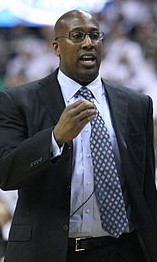Of course, most of his players had run it for years and could have taught it to him. Indeed, he did let them re-install elements of it late last season.
 This season, supposedly with Bryant’s agreement, Brown came up with the brilliant (not) idea of going to the Princeton offense.
This season, supposedly with Bryant’s agreement, Brown came up with the brilliant (not) idea of going to the Princeton offense.
Like the triangle, the Princeton offense asks players to make reads instead of opening up the floor and running pick-and-rolls, the standard NBA offense.
Like the triangle, not all NBA teams can learn the Princeton offense, as new offensive coordinator Eddie Jordan showed in stints coaching the Wizards and 76ers.
At this point, Butch van Breda Kolff, who developed it at (you guessed it) Princeton, must be spinning in his grave.
VBK ran it in two seasons as Laker coach, although with more sturm und drang with Wilt Chamberlain in year two, culminating in their famous loss in Game 7 of the 1969 Finals with balloons festooned overhead after Wilt asked out with a sore knee and Butch refused to let him go back in.
Wilt wasn’t just high-maintenance, but a massive, ball-demanding, low-post presence.
Butch wasn’t into maintenance, or low-post presences.
“Coach van Breda Kolff wasn’t totally in favor of it [the trade which brought Chamberlain from the 76ers] because he wanted to have an open post,” Bill Bertka, then a Laker scout, recently told Laker.com’s Mike Trudell.
“They liked running a lot of high post stuff and back door plays and moving without the ball….
“Chamberlain wasn’t going to be coming out to the high post and handling the ball, which the post man has to do in the Princeton offense.”
That was the polite version. Van Breda Kolff and Chamberlain traded zingers so often, the players called the Times, which tended to report the coach’s comments, “Butch’s paper.” With young beat writer Doug Krikorian riding Chamberlain like a jockey on a thoroughbred, the players called the Los Angeles Herald-Examiner “Wilt’s paper.”
Butch called Wilt “the load.” Wilt said Butch was “the dumbest and worst coach ever.”
In the good news for the Lakers, Brown and Howard bear no resemblance to Butch and Wilt, there is a similar X-O conflict to surmount.
Brown is giving Howard lots of touches in the low post, some after setting high screens, some on post-ups in this hybrid version of the Princeton offense.
So, if they’ve only just begun, the Lakers have enough stuff to work on.
Adding dismay to fans’ anguish, Wednesday’s loss in Portland was blacked out in millions of homes in Southern California with Time Warner, the Lakers’ new benefactor, on the first season of their 20-year $3 billion deal—that’s $150 mill per–having neglected to make a deal with major local carriers DirecTV, Dish Network and Cox Cable.
Time Warner bought a half-page in the Times, advertising the game in Portland–while listing rest of the November schedule fans could miss and urging them to call their providers at 1-855-4-MY-LAKERS or email them at IWANTMYLAKERS.com.
As if that’s getting Time Warner off the hook.
At this point, it’s even money who’ll be the first to get torches and pitchforks and march on company headquarters, Laker fans or Time Warner stockholders.
Of course, the companies have to make a deal… don’t they?
Uh, no. A YES-Cablevision standoff in 2002 blacked out the Yankees in Manhattan, coming off three World Championships in four years.
Check back to see if the Lakes and Time Warner figure it out, or email them at WESTILLHAVETHECLIPPERS.com.
Mark Heisler is a regular contributor to SheridanHoops, LakersNation and the Old Gray Lady. His power rankings appear every Wednesday during the regular season, and his columns and video reports appear regularly here. Follow him on Twitter.